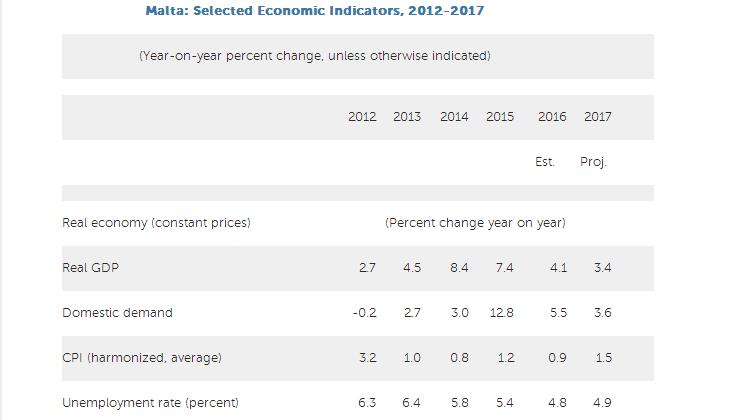The International Monetary Fund has remarked that Malta “is one of the fastest growing economies in Europe”.
An assessment was made following an exchange between Maltese officials and IMF staff, usually held each year as part of the agreement signed by each member state that joins the institution. The IMF staff collect economic and financial information and discusses economic development and policies with the Maltese government.
In a report drawn up, the IMF “commended the authorities for implementing sounds macroeconomic policies, which have contributed to strong economic performance, robust job creation, low unemployment and improved finances.

All in all, the figures quoted by the IMF in terms of Malta’s public finances and employment rate between the years 2012 and 2017 show steady growth and improvement in areas of debt.
“Directors [of the IMF] commended the authorities’ medium-term fiscal consolidation plan, which strikes an appropriate balance between further lowering public debt and sustaining the growth momentum”.
This refers to forward-looking policy rather than decisions which have already been taken over the years.
A summary of Malta’s public finances show an “average growth of nearly eight per cent in 2014-2015, output is estimated to have expanded by 4.1 per cent in 2016, supported by strong domestic demand.”
In its opening remarks, the IMF also praised robust job creation which led to a plunge in unemployment rates, “despite rising labour supply, while subdued wage pressures contributed to low inflation”.

Turning to Malta’s banking system, the IMF noted that domestic banks have remained well-capitlised and liquid, “with profitability well above the levels seen in European peers. Banks’ asset quality continues to improve, while measures have been taken to reduce legacy non-performing loans”.
Despite the heavy praise, the IMF did note that challenges have been identified due to “protracted low interest rates, weak credit growth, legacy corporate non-performing loans (NPLs) and an uncertain external environment.
Lastly, “continued structural reform momentum is needed to support high and inclusive long-term growth”. A call was made for further efforts to increase female labour participation and address a growing skills mismatch issue.